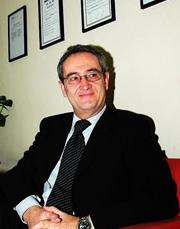
Since its entry into China in 1988, Michelin, the leading tire producer of the world, has developed strong local know-how and established its sales network all over the mainland and in Taiwan. What factors lie behind Michelin's rapid development in China? How do its leaders view the social and commercial environment of the country? To explore the answers to these questions, Beijing Review reporter Yang Jiaqing recently talked with Fausto Casetta, Vice President of Michelin(China) Investment Co., Ltd.
Born in Italy in 1953, Mr. Casetta, is a man of strikingly elegant manners. His Chinese name is Ke Situ, which translates literally as "application of a grand plan." The name suits him perfectly.
"It is the communications department that suggested the name to me," he said. "I am neither ambitious nor absolute. Yet I like the idea of having a long-term plan since it reflects what I hope for and what I should do in China. In other words, I am not here for short-term sales, but for putting in place a commercial approach, a plan for the future. In Western culture, a person's name has no significant meaning. Therefore, having a name with a particular meaning is really interesting to me!"
In China, it is more important to do it fast than to do it well.
Mr. Casetta studied information science before starting his career at Michelin. His first position in Michelin was as its sales representative in Italy. Between 1997 and 2000, he worked in Spain as the national director of sales. He then took up the same position in France, where he was responsible for leading the sales staff of Europe. After a posting in Italy, he was transferred to China as the marketing and sales director of tires for buses and trucks as well as Vice President of Michelin(China) Investment Co., Ltd.
"I arrived in Beijing in September 2005, on orders from headquarters. Yet this was also a personal choice I made. In March 2005, when they proposed assignment in Asia, I decided to stay in Italy. However, when they talked to me about China in July, I accepted it. Why? I regard it as a unique and important experience and my family has supported me a lot in making this decision. It is interesting to me and my daughter likes all things related to Eastern culture. We accepted this offer and in two months, we arrived in Beijing," he said.
"China is a country different from the other two countries I worked in. Very different in terms of culture and size. But I have to confess that even so, I never really experienced any culture shock. The living conditions are really good and this has helped me adapt to the life here quickly. The people are open-minded and agreeable. In the beginning, I had thought it would be easy for me to become integrated into Chinese life. It was not until later that I met with difficulties when I discovered that language was a problem. It was not really easy to have relations with local people and the Chinese proficiency I need for this is difficult to acquire in the short term. But I have always been made to feel welcome and put at ease. Strangely, the experience is different from that in European countries, where I can always integrate myself into society very quickly. "
What he likes particularly about China is the dynamism of the society and the pragmatism of its people. The Chinese in general are good businesspeople because they are capable of adapting themselves rapidly and seizing opportunities. What he appreciates less is the lack of rigor and a tendency to improvise. "Here it seems more important to do it fast than do it well," he said.
In Europe, before changing a commercial approach or creating a new position within the sales staff, a lot of time has to be spent on preparations to make sure the costs can be justified against the expected successes. In China, however, one must learn to develop, apply and readjust a plan according to the evolution of the market. "If people spend a lot of time studying and preparing, they will always be late. By the time people find a solution, the environment has already changed. Therefore, you have to find-and this is what interests me-the balance between doing it fast and doing it well."
|
